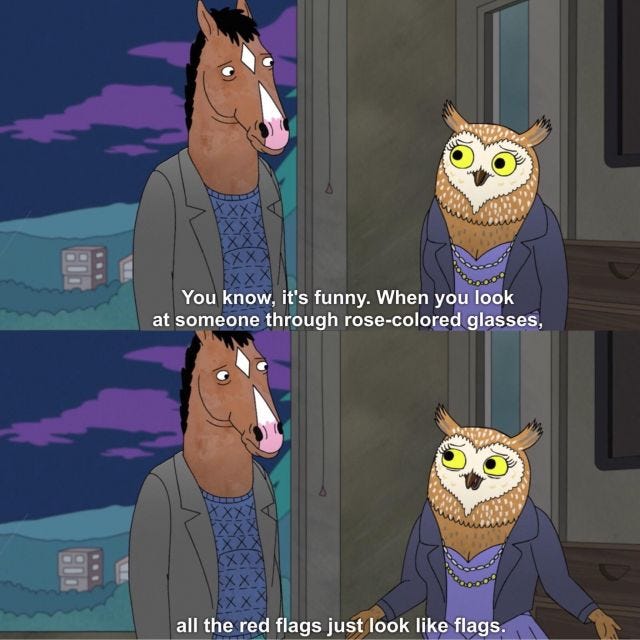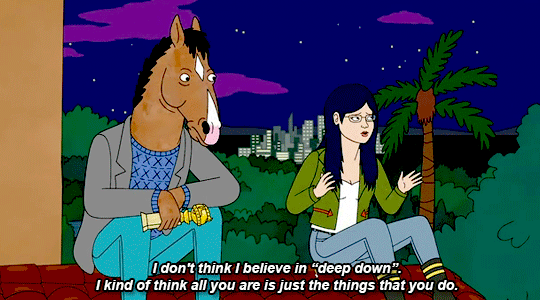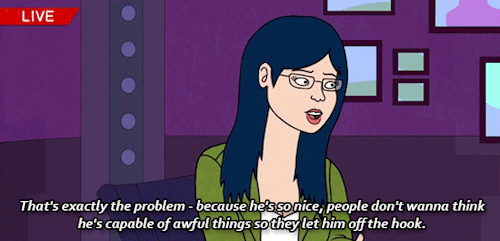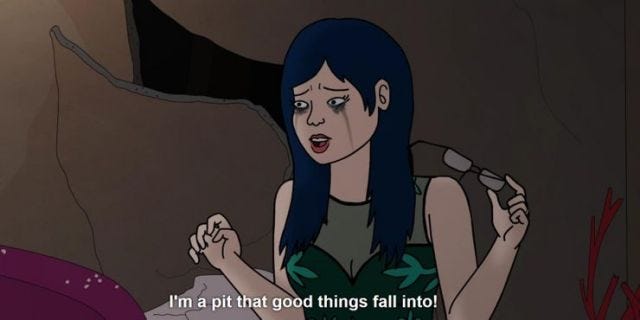Warning: Spoilers ahead
I started watching BoJack Horseman 3 years ago after seeing a friend post screenshots of the part where Wanda and BoJack were confronted with the truth about their relationship. "What happened, BoJack?" asked Wanda. "Same thing that always happens," BoJack shrugged. "You didn't know me, then you fell in love with me... and now you know me."

Then Wanda hits BoJack with that line, which is the very reason why I gave the show a chance. Animals talking about feelings that way? Must be funny (spoiler: it's not). Reciting that out loud makes me cringe now as I have probably quoted that so many times since watching, but it still rings true. I'll save this for another day.
Right from the first watch of this crazy (but very introspective) animated series, I identified with Diane the most. I always said to myself that I identified with both Diane and Princess Carolyn, but if you know me personally, I'm nowhere near PC—what I only share with her is this desire to always help others, even if it means compromising myself.
Diane Nguyen is hired as BoJack's ghostwriter for the memoir he couldn't get around with writing himself, and her relationship with BoJack is a huge part of the show. Attracted to her almost instantly, BoJack struggles to open up to her as he was afraid of what she would think of him as soon as she finds out about everything, warts and all. Eventually he learns to slowly do so, and Diane does the same.
Their relationship quickly gets complicated toward the end of season 1, where BoJack fires Diane after she published a teaser of the book that the former dreaded reading. This introduces a cycle that becomes a consistent part of the show: BoJack goes on a bender, realizes a bunch of shit, and reaches an epiphany of some sort that motivates him to change for a limited period of time... then he's back on his bullshit before you know it. After we witness his first bender, he attends the ghostwriter convention that Diane was part of and asks her if she thinks that he's a good person (horseman, rather). Shocked beyond words, Diane is unable to answer his question, leaving BoJack upset—not that Diane ever owed him validation, but throughout the series he constantly seeks this.
Diane's views on morality are revealed in the final episode of the first season, where she and BoJack reconcile and talk about what had happened. She goes on to say that there's no such thing as deep down to her, which was why she struggled to answer BoJack. As we follow BoJack's misadventures, the irony becomes more noticeable: Diane is always one of the first (if not the only one) people to call others out on their wrongdoings because she doesn't believe in deep down, yet she has difficulty trying to be good and to do good.

She holds those around her to a higher standard, expecting them to do what's right. From calling out sexual harassers in the industry to trying to expose the evils of capitalism, Diane often tries to fight for the greater good, even if others refuse to take a stand or discourage her from doing so. Throughout the show, you see that Diane feels the need to do what is right and to encourage those around her to—if not guilt them—do the same. In the moments that she is able to do the right thing (or at least what feels right to her) for the sake of the greater good, the achievement is often accompanied by dread.

Diane exhibits an irony in being the moral compass of one's group: you always talk about doing what's right and you often guide people when it comes making the morally right decision, but it's all—okay, mostly—theory to you. Putting it into practice feels much more challenging because there's always this fear of not ending as fulfilled as you expected to be. Why then does doing good matter if I still feel miserable after doing what's right?

This becomes much more evident in the later seasons when Diane is forced to confront her own issues after breaking up with Mr. Peanutbutter. Who are you now that you don't have anyone else to project your insecurities on to? What do you do when you spend much of your time calling people out? What happens when you're left alone with your flaws that you notice more in others than yourself? She tries to answer these questions throughout Season 5, and in Season 6 we get a picture of her downward spiral in Good Damage that explains why she finds it hard to do the right thing for herself.
![bojackscenes) en Instagram: "Good Damage [6x10] in 2020 | Bojack horseman, Horseman, Movie co bojackscenes) en Instagram: "Good Damage [6x10] in 2020 | Bojack horseman, Horseman, Movie co](https://substackcdn.com/image/fetch/$s_!dsPt!,w_1456,c_limit,f_auto,q_auto:good,fl_progressive:steep/https%3A%2F%2Fbucketeer-e05bbc84-baa3-437e-9518-adb32be77984.s3.amazonaws.com%2Fpublic%2Fimages%2F580fe707-aa9a-4ebd-838a-a111f13b86dd_1080x1080.jpeg)
Much of Diane's actions are anchored on this need to turn the bad into good, to transform your pain and maybe exploit it for money, to find significance in the times she was met with disappointment and hurt so that accepting what happened feels less heavy. This is first seen in Season 1 when she tried to organize a funeral for her father that she resented; it doesn't do her much good, but because of her relationship with BoJack, she finds the silver lining: a letter from her old pen pal. Diane both seeks and attracts awful situations, not because she enjoys the victimhood, but because the bad is often her impetus for doing the right thing.
I think it's a double-edged sword when one has this reflex of using their negative energy for something good or useful. On one hand, sure, you're trying to cope with how it has broken you. On the other, there is little to no room left to acknowledge that sometimes the damage is just damage, and there's no other way around it than to accept it as it is.
“But it made you stronger” I was a child. I didn't need to be stronger. I needed to be safe.
—some random Facebook post I came across sometime last year
I don't think we always have to make use of the damage we have or the trauma we gained in our failed attempts of being good to and for others. There are times when we have to let our guard down for a bit and admit that now is not the time to be strong or to be right. And that's OK. It doesn't make us bad, but neither does it do us any good if we overstay our welcome.
What I'm trying to say here is that it is so difficult to unlearn being hard on yourself when pretty much all your life you've been conditioned into seeking pressure because it's what you're most familiar with. But like I always tell people, even if I have a hard time believing it myself: it matters that you try.
The biggest lesson that Diane has taught me is that when you do the right thing in hopes of a serotonin boost, you're headed for disappointment and a loss of self. In some ways we are shaped by our beliefs and the decisions we make, but to keep us from going insane at times, we have to believe in deep down—that our worth is not something we strive to earn or convince others of its existence the way religion keeps telling us that there is a god to worship. I like to believe that our worth is not diminished every time others fail to be the people we need them to be, or when we extravagantly set ourselves up for failure. In the pursuit of doing the right thing and compensating for the times we've been let down or let others down, we need to exercise a bit more compassion toward ourselves. When we fail to do what's right, we should allow ourselves to grieve for a bit, then we learn, and we decide to do better. It's easier said than done on most days, but what truly matters is that we try to bridge the gap between who we are and who we would like to be.


